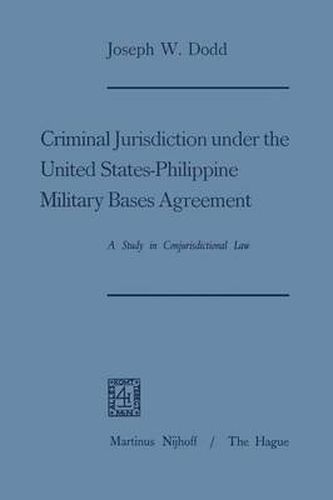Readings Newsletter
Become a Readings Member to make your shopping experience even easier.
Sign in or sign up for free!
You’re not far away from qualifying for FREE standard shipping within Australia
You’ve qualified for FREE standard shipping within Australia
The cart is loading…






This title is printed to order. This book may have been self-published. If so, we cannot guarantee the quality of the content. In the main most books will have gone through the editing process however some may not. We therefore suggest that you be aware of this before ordering this book. If in doubt check either the author or publisher’s details as we are unable to accept any returns unless they are faulty. Please contact us if you have any questions.
The peace time stationing for collective security purposes of large numbers of military personnel of one country in the territory of an other country constitutes one of the most significant developments of postwar international relations. The United States, for example, has stationed nearly one half of its active military forces in over seventy 1 countries since the Korean War broke out. Stambuk noted that al though the theories rationalizing this situation have changed, the overseas bases and forces remain. 2 As a direct result of this stationing of large numbers of troops in foreign countries numerous bilateral and multilateral status of forces agreements have been put into force. One aspect of these agreements which has attracted considerable attention is the provisions dealing with the right to exercise criminal juris 3 diction. As might be expected, a host of jurisdictional problems has arisen concerning whether jurisdictional rights lie with the states sending or the states receiving military personnel, the accompanying civilian component, and their dependents. As Snee and Pye have pointed out: For the first time in the modern era, the sometimes radically different systems of law of two sovereign nations are operating within the same territory and in respect to the same individuals. 4 Thus a situation has arisen in which the relationships between the military authorities of the 1 George Stambuk, American Military Forces Abroad (Columbus, Ohio: Ohio State Vni versity Press, 1963), pp. 3-4.
$9.00 standard shipping within Australia
FREE standard shipping within Australia for orders over $100.00
Express & International shipping calculated at checkout
This title is printed to order. This book may have been self-published. If so, we cannot guarantee the quality of the content. In the main most books will have gone through the editing process however some may not. We therefore suggest that you be aware of this before ordering this book. If in doubt check either the author or publisher’s details as we are unable to accept any returns unless they are faulty. Please contact us if you have any questions.
The peace time stationing for collective security purposes of large numbers of military personnel of one country in the territory of an other country constitutes one of the most significant developments of postwar international relations. The United States, for example, has stationed nearly one half of its active military forces in over seventy 1 countries since the Korean War broke out. Stambuk noted that al though the theories rationalizing this situation have changed, the overseas bases and forces remain. 2 As a direct result of this stationing of large numbers of troops in foreign countries numerous bilateral and multilateral status of forces agreements have been put into force. One aspect of these agreements which has attracted considerable attention is the provisions dealing with the right to exercise criminal juris 3 diction. As might be expected, a host of jurisdictional problems has arisen concerning whether jurisdictional rights lie with the states sending or the states receiving military personnel, the accompanying civilian component, and their dependents. As Snee and Pye have pointed out: For the first time in the modern era, the sometimes radically different systems of law of two sovereign nations are operating within the same territory and in respect to the same individuals. 4 Thus a situation has arisen in which the relationships between the military authorities of the 1 George Stambuk, American Military Forces Abroad (Columbus, Ohio: Ohio State Vni versity Press, 1963), pp. 3-4.